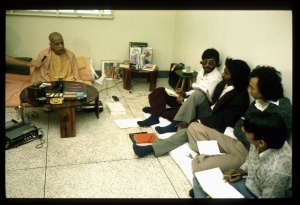BG 12.2 (1972): Difference between revisions
No edit summary |
(No difference)
|
Latest revision as of 08:21, 14 December 2017

A.C. Bhaktivedanta Swami Prabhupada
TEXT 2
- श्रीभगवानुवाच ।
- मय्यावेश्य मनो ये मां नित्ययुक्ता उपासते ।
- श्रद्धया परयोपेताः ते मे युक्ततमा मताः ॥२॥
- śrī-bhagavān uvāca
- mayy āveśya mano ye māṁ
- nitya-yuktā upāsate
- śraddhayā parayopetās
- te me yuktatamā matāḥ
SYNONYMS
śrī bhagavān uvāca—the Supreme Personality of Godhead said; mayi—unto Me; āveśya—fixing; manaḥ—mind; ye—one who; mām—unto Me; nitya—always; yuktāḥ—engaged; upāsate—worships; śraddhayā—with faith; parayā—transcendental; upetāḥ—engages; te—they; me—Mine; yuktatamāḥ—most perfect; matāḥ—I consider.
TRANSLATION
The Blessed Lord said: He whose mind is fixed on My personal form, always engaged in worshiping Me with great and transcendental faith, is considered by Me to be most perfect.
PURPORT
In answer to Arjuna's question, Kṛṣṇa clearly says that he who concentrates upon His personal form and who worships Him with faith and devotion is to be considered most perfect in yoga. For one in such Kṛṣṇa consciousness there are no material activities because everything is done by Kṛṣṇa. A pure devotee is constantly engaged-sometimes he chants, sometimes he hears or reads books about Kṛṣṇa, or sometimes he cooks prasādam or goes to the marketplace to purchase something for Kṛṣṇa, or sometimes he washes the temple or the dishes-whatever he does, he does not let a single moment pass without devoting his activities to Kṛṣṇa Such action is in full samādhi.